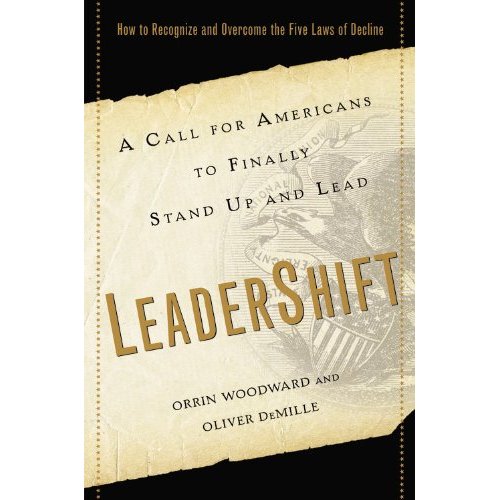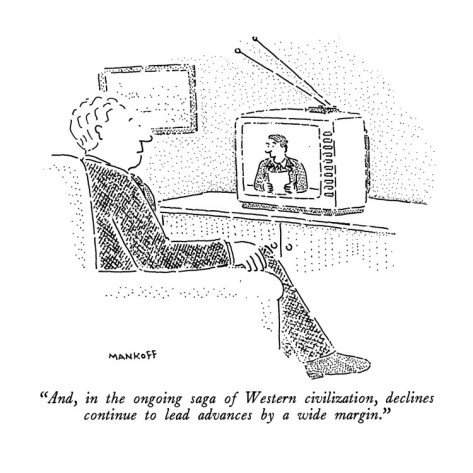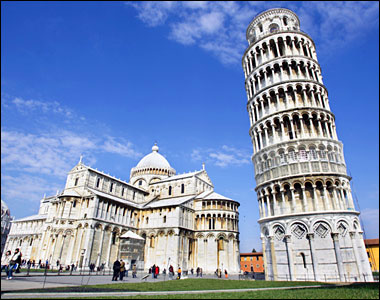
LeaderShift by Orrin Woodward & Oliver DeMille
LeaderShift isn’t a political party, but it is a freedom movement of productive members in society (of both left and right persuasions), who are concerned about the decline in dialogue, decision-making, and direction of our country’s political leaders. Oliver DeMille and I wrote LeaderShift to provide new thinking to an old problem, using the Five Laws of Decline to describe the process. Governments, by their very nature, tend to centralize and control. Indeed, local leadership and freedoms are inversely proportional to centralized powers and control.
Consequently, LeaderShift isn’t just a book, but a movement to restore the freedoms lost over the last 100 years (read 1913 for more details). I have included an article by Oliver DeMille on his thoughts of the failure of America’s party system to revive the American dream. Interestingly, Oliver and I, from independent tracks, both came to the same conclusion that entrepreneurs must teach the concepts of dreaming, goal-setting, and learning within the framework of freedom! Oliver is one of the best thinkers on society, state, and freedom that I know and I enjoy our friendship immensely. This article will make the reader think.
Sincerely,
Orrin Woodward
In the aftermath of the 2012 election, there have been numerous emails, posts, articles and blogs by business owners who say they are planning to sell or close their businesses, or just lay off enough workers that they can afford Obamacare for the employees who remain.
One summary listed the following announced layoffs—all attempts to deal with the new costs of Obamacare:
- Welch Allyn, 275 layoffs
- Stryker, 1170 layoffs
- Boston Scientific, between 1200 and 1400 layoffs
- Medtronic, 1000 layoffs
- Smith and Nephew, 770 layoffs
- Hill Rom, 200 layoffs
- Kinetic Concepts, 427 layoffs
- Coviden, 595 layoffs
- Abbot Labs, 427 layoffs
- St. June Medical, 300 layoffs
There are many, many others.
One email dated November 7, the day after the election, read:
“Time to sell our business. We can no longer afford to provide a living for 14 employees as soon we’re forced to pay for their healthcare. So sad, too bad. On to new ventures.”
After responses about how sad this is and others pointedly blaming the Obama Administration, the same person continued:
“We are all Americans and need to find common ground and make this country great together. I’m not mad at anyone for voting different than me. They love their president, don’t lose friends over calling him a dictator. I’m excited to sell our business. We are adventurous!”
That’s the entrepreneurial spirit that made America great.
Not: “Oh no, we’re losing our job. Will the government help us?”
But rather: “Hey, change happens. We’re excited. This is going to be an adventure!”
That’s the American spirit.
And while rumors abound about how much Obamacare will cost each small business and which won’t have to make any changes at all, there are a lot of employers right now who are very concerned.
Those with under 50 employees aren’t supposed to be hurt, but smaller employers are still worried about exactly how the new laws will be enforced.
Sadly, we will likely see a lot of change in small business in the months and years just ahead.
More regulation, higher taxes and drastically increased costs of employing people will make things more difficult.
An exception may be in network marketing companies or compensated communities.
I’ve long considered them among the top entrepreneurial opportunities in free nations, and with the current changes and policies this is even more true.
“My son is a doctor,” Marge said proudly.
“Wow,” Betty said with a concerned voice. “How is your son dealing with the new regulations coming into effect under Obamacare?” she asked.
Marge nodded and her face grew serious. “He’s very concerned, to tell the truth.”
“Fortunately, my son is building a huge network marketing company, and the regulations aren’t hurting him much,” Betty said. “Maybe your son would like to meet with mine about an opportunity?”
This kind of conversation is taking place a lot right now, and all indications are that it will increase.
Some parents are recommending that their college children put school on hold and start a network business, and I know two medical doctors who have gotten out of the profession in order to build networking businesses.
One of them talked two of his sons into quitting college and doing the same, though the three of them all ended up building networking organizations with entirely different companies.
II. The Party of Small Business
All of this got me thinking today, and as I pondered I realized something. Something big.
Something we really need right now in America.
We need a third party.
Actually, we need a new party that becomes more popular than the Republican Party and the Democratic Party.
There are more independents than members of either big party, so this shouldn’t be too much of a stretch.
Here’s the problem: The Democratic Party is now the unabashed party of big government, the welfare state, rule from Washington D.C., and everything that goes with these values.
The Republican Party touts itself as the party of freedom, limited government, free markets and business, but in fact it is the party of big business and a big-spending government at the same or just slightly lower levels than Democrats.
We have a party of Big Government (with big business as its co-pilot), and another party that emphasizes Big Business (with big government as its co-pilot).
The first is the Democratic Party, the second the GOP.
Neither is now effectively serving the needs of our nation.
As a result, we get bigger government regardless of who gets elected, and big business grows (to the frequent detriment of small businesses) regardless of who is in power in Washington.
In all of this, small businesses, families, communities and the middle class are the losers.
The solution? We need a party of small business.
We need a party whose top priority is the needs of families and small businesses.
This new party needs to reject the big-government and anti-free enterprise values of the Democrats and simultaneously the big-business and anti-immigrant attitudes of Republicans.
It needs to embrace toleration, diversity, reduced government regulations, lower taxes, decreased government spending, incentives for entrepreneurship, a charitable safety net, and incentives for more immigrants to bring their capital, businesses, labor and families to America.
It needs to get rid of the barriers to hiring (such as the increasing required health care costs) and drastically reduce government red tape for small businesses.
It needs to allow more innovation, shrink requirements on licenses and permits and other unnecessary costs that decrease entrepreneurship and growth, and create an environment of seamless partnerships between schools and businesses.
It needs to promote, encourage and incentive a lot more initiative, innovation and entrepreneurialism.
It also needs to push for more creative and independent thinking in the schools and less that is rote, conveyor-belt, and pre-scripted.
It should change the way schools are run, replacing an environment where administrators and bureaucrats feel comfortable to one led by proven innovators and others who have been successful in the real economy, the FOR-profit economy.
Forget teacher certification and unions—if we want to compete in the global economy we need innovators leading our classrooms.
As an example, principals and teachers should be hired who have excelled at implementing successful business plans rather than writing resumes.
And funding should flow to schools that excel in a true free market.
To ensure to that no child is left behind (for example in less-advantaged neighborhoods), even larger premiums should go to innovators who successfully turn dumpy schools into flourishing institutions whose graduates thrive.
The new party should apply similar principles to other kinds of organizations, from health care and community governments to every other sector of the economy.
Small businesses bring the large majority of growth in the economy, and the new party needs to begin with the specific needs of small businesses in mind.
It needs to identify things that hurt small business and repeal them, and find out what helps small businesses succeed and introduce more policies that encourage these things.
It needs to rewrite the commercial and legal code to create an environment where innovation is the norm, along with the values of growth, calculated risk, leadership, creativity, and entrepreneurialism.
It needs to be not the party of jobs, but the party of successful business ownership—and the jobs they naturally create.
III. A Bright Future?
We need a third party. The party of Big Government (with big business as co-pilot) and the party of Big Business (with big government as co-pilot) simply aren’t doing what our nation needs anymore.
It’s time for new thinking and new leadership.
There is an old saying that you can’t pour new wine into old bottles, because the residue of past wine always taints the new.
This is where we are in America.
The current parties, as much good as both have done at times, have peaked and are in decline.
New leadership is needed, along new values untainted by the baggage of two parties whose time has come and gone.
It is perhaps possible to reform one of the parties to get better results, but it is likely that only a new party with an entirely new focus and fresh thinking is going to take America where it needs to go.
Democratic nations are notorious for refusing to change until crisis forces their hand, and I suspect this is what we’ll witness in the 21st Century.
At some point, probably after major crisis and a superhuman American response, we’re going to need a new party.
Those who love freedom should start thinking about what it should look like.
One thing is clear: When it does come, it needs to be a party of small business.
Free enterprise and the entrepreneurial spirit made America great, and it will do so again if we let it.
Whatever comes in the economy, we want to be led by those whose attitude is, “It might sound bad, but this is an exciting adventure! Let’s get started…”










